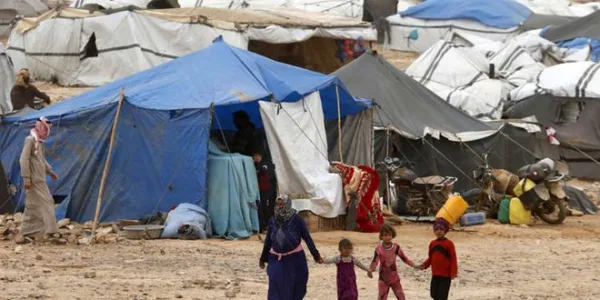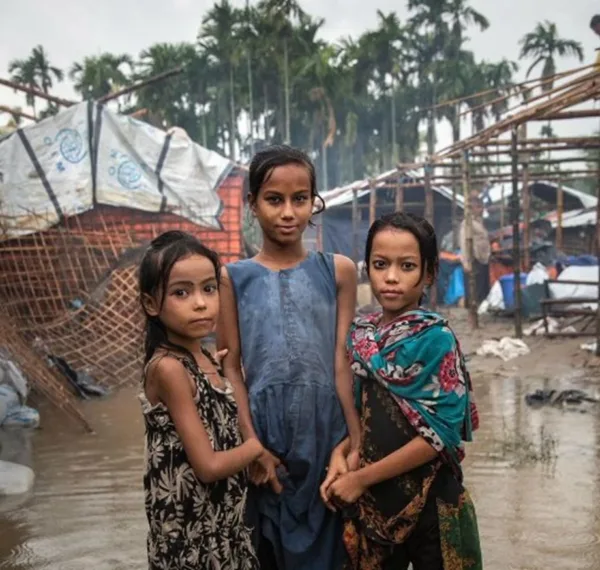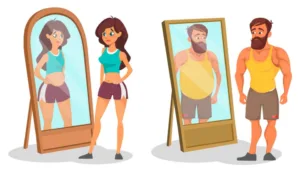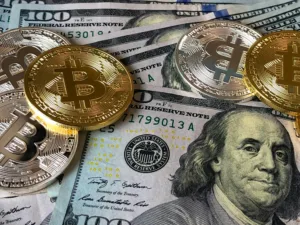Picture this: you are standing knee-deep in murky waters, but they keep on rising. You frantically rush to clutch at the remnants of your life as your parents shove your coat, documents, and a bottle of water into your hands and thrust you onto a boat. They urge you to row the boat and stay safe. Your journey is one of survival, devoid of rights and opportunities, without a destination and no home to return to as you watch your land swallowed by forces outside of your control. This is the harsh reality of climate change, the grim truth of 18 million climate refugees in Bangladesh alone. When you reach the border, your soaked documents render you defenseless; you’re just another victim of circumstances. You’re thankful to be registered in a refugee camp, but soon you realize that in fact you got registered in a prison camp with no rights to employment, no access to clean water or secure housing – scarcity becomes the breeding ground for conflict. At least, you are not alone, you’re a precursor to the estimated 1.2 billion climate refugees by 2050.
The paradox of today, however, is that despite the fact that climate change fundamentally knows no borders, respects no income levels, and plays no geopolitical games, a stark and disproportionate divide emerges. Amidst this globally shared threat, the middle and upper classes have been unbelievably good at dodging the immediate effects of climate change as they remain largely shielded from the immediacy of climate change impacts. The privilege to adapt, to switch on an AC during a scorching Madrid summer, underscores the brutal reality faced by people in Somalia, who are left defenseless against extreme weather. It is a heinous fact that those least responsible for the carbon footprint are the ones disproportionately bearing its consequences. The wealthiest nations and coincidentally top emitters, like China, the United States, and India, contribute over 42% of global emissions, while the bottom 100 countries are accountable for a mere 2.9%. Such data emphasizes the responsibility of the developed world in displacing families and robbing countless children of homes and futures.

To better understand the size of the discrepancies and inequality, imagine that one grain of rice represents one ton of carbon dioxide. An average person in Nigeria is responsible for adding less than one grain into the atmosphere each year, in India two grains, in China seven grains, in Germany ten grains, and in the US all of the 17 grains. In one year, an average American pollutes 20 times more than an average Nigerian. The global carbon footprint falls disproportionately on the shoulders of the most impoverished nations. Nonetheless, the problem does not stop there, it is also about how much carbon dioxide has piled up over time. This amounts to 2400 Gigatonnes since 1850 (to 2019) which is equivalent to more than 3 million rice bags, and it is clear that it was the industrialized states who contributed the largest share.
This makes the world’s most industrialized countries always partly responsible for the displacement of a family who fled searching for clean water or a child who lost his home in a flood. The citizens of the Western world, myself included, must admit the privilege of not facing the direct effects of climate change because we have the money to adapt to it.

Climate change disproportionately affects the world’s poorest countries and the poor. This graphic (you can find the graphic on page 8 of the report) visualizes the radical inequality that takes place due to climate change. The red bar represents the relative income losses, presenting that it will be the bottom 50% of the world’s population, people who live under 5.5 dollars a day who will bear a staggering 75% of all income losses in the world due to climate change. Instead of punishing those most responsible for gas emissions, climate change further empowers the most culpable and the most privileged. It is the innocent who are forced to pay up with their lives, but most importantly, those who can least afford it. Meanwhile, the top 10%, responsible for 48% of global carbon emissions, possess the capital needed for a green transition but remain shielded from the ravages of climate change. The top 10%, owners of capital critical for a green transition, find themselves shielded from the very consequences of climate change they perpetuate, and so are encouraged to take the course of inaction because they can always simply pay up to accommodate their needs.
The discrepancies in capital ownership also highlight how limited access to capital there is in certain regions like Africa, areas most affected by climate change due to their geographic placement, which results in market inefficiencies. Those who actually can adapt and invest often do not make suitable investments at home and abroad, driven by their own self-interests to give out the money with one hand but put more money back into their pockets with the other.

As we approach 2050, these trends will continue to diverge, emphasizing the urgent need to address poverty and inequality to effectively combat climate change. Bridging these gaps requires a paradigm shift in our mentality and collective action. These undeniable facts are a wake-up call for all to confront the inequalities head-on to bridge the gaps between the wealthy and the poor. Without stopping poverty, there is no world where climate change stops being a risk to humanity.
Empowering the most affected nations is a crucial first step. However, the pursuit of wealth to adapt often comes at the cost of increased carbon emissions, creating a self-defeating cycle from a global perspective. That is why it is in the self-interest of all wealthier nations to assist developing countries in their adaptation efforts by fostering education, ensuring healthcare, and safeguarding children’s rights. People must be at the epicenter of this transformative cause.
Behind every statistic, there are millions of people on the brink of starvation. Every number represents a life in crisis. In hospitals, children suffer from severe malnutrition, even though solutions exist. We must ask ourselves, how many children must needlessly die before the world says “ENOUGH”? The United Nations and experts worldwide have repeatedly warned us against new investments in fossil fuels. The business models of oil and gas companies are simply incompatible with human survival. How many experts must explain this before the world says “ENOUGH”?

It is time we realize that our world is deeply interconnected, and so does the suffering of one affect us all. To combat climate change, we must first battle poverty. Only then can we break free from the shackles of inequality and forge a sustainable future where no one is left behind.
Now, imagine you’re a climate refugee, stripped of dreams and forced to abandon your home. You’re not alone, 18 million people in Bangladesh face a similar fate. As you stand at the border, your documents soaked, your life in chaos. You enter a refugee camp with no employment rights, no access to clean water, and no secure housing. Scarcity breeds conflict, and the question lingers – what will you do?
Featured image: People ride on boat in flooded area after heavy monsoon rains in Dohar near Dhaka, Bangladesh on July 24, 2020. More than 9.6 million people have been affected by monsoon floods, devastating large areas of India, Bangladesh and Nepal. (Stringer – Anadolu Agency)







